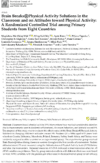Abstract
Classroom-based physical activity (PA) interventions have received considerable attention due to improvements seen in academic achievement, classroom behaviours, and attitude toward PA. The purpose of this study was to evaluate the effectiveness of the Brain Breaks® Physical Activity Solutions in changing children’s attitudes toward PA. Students (N = 3036) aged 8–11 years from schools in Croatia, Lithuania, Macedonia, Poland, Romania, Serbia, South Africa, and Turkey were randomly assigned to either a control or an experimental group. The experimental group received Brain Breaks® videos during classroom sessions throughout the four months of intervention. Student attitudes toward PA were measured using the Attitudes toward Physical Activity Scale (APAS) before and after the intervention. Repeated measures ANOVA indicated a time interaction effect for all APAS variables except fitness. Time-by-group interaction effects with different effect sizes were found for most APAS variables, with the greatest gain effect noted in the experimental group for self-efficacy, followed by learning from the videos concerning PA benefits, exercise importance, and enjoyment from engaging in PA.
This study provides evidence supporting Brain Breaks® in terms of learning experience, attitudes towards PA, and personal motivation. Using exercise videos is recommended as an interactive, technology-based PA solution that can be easily integrated into the school setting.



Responses